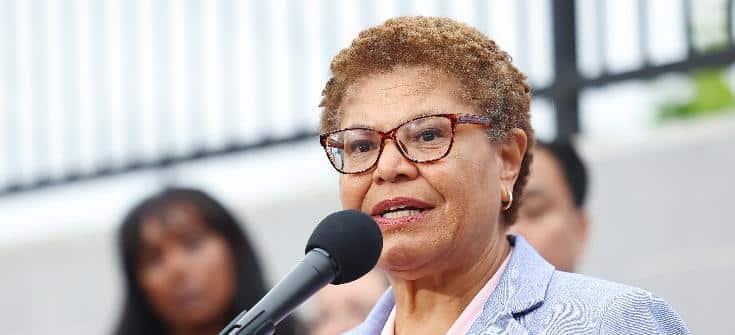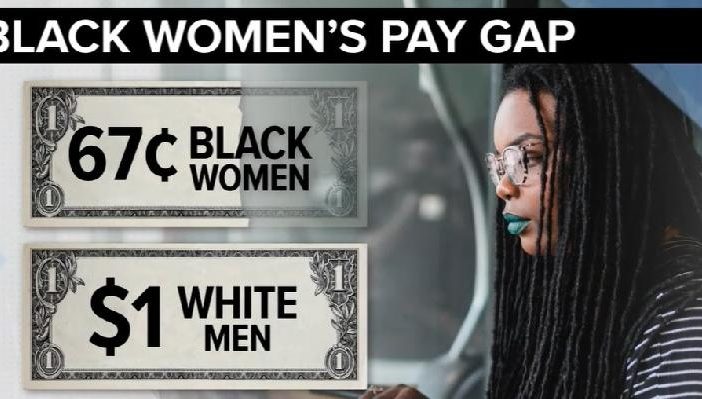California First Partner Jennifer Siebel Newsom says, “gender discrimination is the oldest form of oppression … more obvious with Black women,” and America must act urgently to fix it.
*Although California has some of the strongest pay laws in the nation and the smallest gender pay gap, Siebel Newsom says the Golden State still has work to do to close the wage gap for all women, especially Black women.
For Black women, the first partner says, closing the wage gap is “most obvious.”
“Black women live at the intersection of racial and gender discrimination leaving them doubly impacted by the wage gap,” said Siebel Newsom. “Pay inequities and gaps in wealth and economic opportunity are deeply rooted in our country’s long-standing history of racism and misogyny.
To mark Black Women’s Equal Pay Day Siebel Newsom released a video on July 27 along with Los Angeles County Supervisor Holly J. Mitchell, Los Angeles Mayor Karen Bass, and PolicyLink Founder in Residence, Angela Glover Blackwell.
“Today is Black Women’s Equal Pay Day – a day set aside each year to shine a light on the disparity in pay for Black women in this country and the far-reaching impacts for families, communities, and our economy,” said Bass in the video.
 LA Mayor Karen Bass (Getty)
LA Mayor Karen Bass (Getty)
“Economic injustice is a problem across the board, and to solve problems effectively and authentically, we have to focus on those most impacted. Together, we will work to close this gap,” the mayor of California’s largest city continued.
On average, women earn 84 cents for every dollar a non-Hispanic White man does. That breaks down to Black women earning 67 cents; Latinas and Native Americans 57 cents; mothers 74 cents; LGBTQIA women 87 cents and women in leadership positions 72 cents for every dollar a non-Hispanic White man earns. Women are hired into lower-paying roles at lower starting salaries and take longer to move into leadership roles.
Black women are overrepresented in industries that experience significant downturns. A report by the Department of Labor found that in 2020, 12% of Black women were employed in education and health services but a disproportionate number of them (14.9%) experienced job losses. Also, in wholesale and trade, the majority of losses were Black women. In that sector, Black women comprised 5.6% of the workforce but 14.6 % of the job losses.
According to the report, Black women lost out on $39.3 billion in potential wages due to differences in industry and occupations relative to White men.
Racism and sexism are two of the obstacles that Black women face in the workplace. More than half of Black women surveyed for a 2021 National Women Law Center reported facing gender and racial hurdles to opportunity at work.
In 2019, Siebel Newsom launched the California for ALL Women, initiative to address gender equity at the state level. Through the initiative, she has been an outspoken champion and thought leader on pay equity, working to close the race and gender wage gaps.
That same year, Siebel Newsom announced the California Equal Pay Pledge under California for all Women to build upon California policies such as the Fair Pay Act.
In 2022, Gov. Gavin Newsom signed into law the Pay Transparency for Pay Equity Act, introduced by Senator Monique Limón (D-Santa Barbara). This law requires employers to disclose salary ranges on all job postings and to allow public access to pay data broken down by race, ethnicity and sex for direct employees and those hired through third-party staffing agencies.
“As there is more transparency in the hiring and promotion process there will be outcome in closing the pay gap across companies,” said Siebel Newsom.
Mitchell says she is proud to stand with the first partner and other women and allies around California and the United States to end racial and gender pay discrimination.
“Intentional and bold action on closing the wage gap among Black women and women of color is needed across every sector and will put us on a path to truly ensuring all women, their families and communities are no longer shortchanged from economic prosperity,” said Mitchell.
Recently, Siebel Newsom convened and moderated a panel on pay equity at Genentech in South San Francisco. Genentech was an early signatory of the Equal Pay Pledge. The panel included Genentech CEO Alexander Hardy, Interim Chief Diversity Officer Cari DeLoa, and representatives from other parts of the business.
In addition to Genentech, there are 130 other companies and municipalities in California that have signed the Equal Pay Pledge. While acknowledging that this is not a significant number, Siebel Newsom said that there are several major global companies, like Apple, Intel, Twitter, Airbnb, Salesforce and Gap, that “are committing to equity and fairness in their policies.”
“Closing the pay gap for Black women is an essential step for economic justice,” said Glover Blackwell. “When Black women and other women of color are paid equally, we’ll see the benefits cascade throughout society.”
Jaya Padmanabhan is a freelance journalist and a consulting editor for Ethnic Media Services.
Source: Jaya Padmanabhan | California Black Media
MORE NEWS ON EURWEB: Black Caucus Concerned About Black Women Leaving Entertainment Industry
We Publish News 24/7. Don’t Miss A Story. Click HERE to SUBSCRIBE to Our Newsletter Now!



